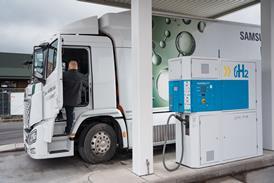In our latest postcard from India, Ramesh Kumar gives an update on the prospects for hydrogen as the zero-emission fuel of choice for the Indian commercial vehicle sector.
Hydrogen, the colourless, odourless, and lightest chemical element, has recently become prominent in the Indian business landscape, he writes. Billion-dollar investments in hydrogen have been unveiled to support the climate change agenda, with the recent “Reduce-the-fossil-fuel-dependence” campaign gaining major traction. All this with the aim of India, as a signatory to the United Nations Framework Convention on Climate Change (UNFCCC), meeting its net zero carbon emissions by 2070.
Five million tonnes of hydrogen as an alternate fuel by 2030 has been declared under the National Green Hydrogen Mission initiative launched in January 2023 with a budget of approx. Rs.20,000 Crore (US$2.2 billion) to be spent by the end of March 2030. The companies lined up to produce green hydrogen include government-owned oil and gas companies and a few private sector giants: Indian Oil Corporation, Gas Authority of India Limited, Oil & Natural Gas Corporation, National Thermal Power Corporation, Reliance Industries, Adani Group, and Larsen & Toubro, among others.
Essar Group, another petrochemical-to-steel giant, is the latest to join this elite band. It plans to foray into green hydrogen with an investment of Rs.30,000 crore ($3.6bn) in Jamnagar, Gujarat state, on the western coast. Like Reliance, which has started strategic targeting of producing green hydrogen at a cost of $1/kg, Essar is looking at developing one Gigawatt of hydrogen capacity over the next five years.
Through its sister concern, Essar Renewables, it plans to split water molecules to produce hydrogen and oxygen. Through yet another wholly-owned sister company, GreenLine Mobility Solutions, Esssar Group has launched LNG heavy commercial vehicles (trucks) to decarbonise and pave the way for clean transportation. Its major clients are major bulk transporters in cement, fertilizer and coal, and is a clear demonstration of things starting to move now.
With the budget for the current financial year (2024-25) hardly a few weeks away, the government-owned oil marketing companies are preparing fresh blueprints for presentation to their parent federal ministry - the ministry of petroleum and natural gas - which in turn would lobby with the finance ministry for extra focus (financial incentives, etc) in the current fiscal year towards meeting the five million tonnes of hydrogen by 2030.
Simultaneously the ministry of new and renewable energy, revised the target for the production of green ammonia as part of the National Green Hydrogen Mission from 550,000 tonnes per annum to 750,000 tonnes under the Strategic Interventions for Green Hydrogen Transition (SIGHT) Programme. This initiative comes in the wake of rising demand for ammonia in the fertilizer segment. It is pertinent to note that the SIGHT programme was announced in January this year. The quick upward revision in the estimate signals the eagle eyed watching of this vital sector to boost hydrogen towards the clean energy transition.
Meanwhile, the South Korean auto giant Hyundai, India’s second largest passenger car manufacturer, is collaborating with leading academic institution the Indian Institute of Technology-Madras (IIT-Madras) to set up the Hydrogen Valley Innovation Lab along with the Guidance Tamil Nadu, the southern state’s investment promotion agency. Hyundai would be bearing approximately 50% of the cost of this venture estimated at around Rs.180 crore ($21.5m).
Significantly, Hyundai Motor Company’s President and CEO Jaehoon Chang joined as the new Co-Chair of the Global Hydrogen Council, along with Sanjiv Lamba, CEO of Linde. Together, the two Co-Chairs will work closely with Hydrogen Council member CEOs as the organisation enters its next chapter, focused on unlocking the potential demand for a global hydrogen economy and creating a framework for international trade and accelerated investment.
Hero Future Energies, an offshoot of India’s leading two-wheeler giant is also entering the renewable energy sector, and is exploring green hydrogen plants in India, the United Kingdom and Europe with its partner Ohmium International. Another Nasdaq-listed Indian company, Renew, signed an exploratory framework agreement with Egypt to set up a green hydrogen plant in the Suez Canal Economic Zone. In India, Renew is busy setting up hydrogen plants in several states (Odisha, Andhra Pradesh, and Maharashtra).
Avaada Group is yet another player foraying into this segment. It is planning 4 million tonnes per year (MTPA) capacity of various types of green fuel, such as green ammonia, green methanol, e-methanol and sustainable aviation fuels. It is developing an integrated renewable energy, green hydrogen and green ammonia plant of 0.5 MTPA capacity, including storage and related port infrastructure, in Odisha.














